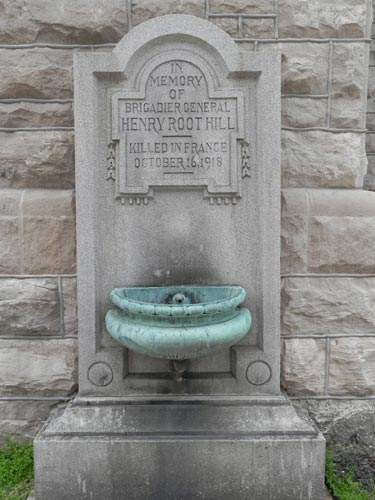A Quincy hero not to be forgotten

“In Memory of Brigadier General Henry Root Hill. Killed in France October 16, 1918.”
Every time I have to stop at Fourth and Maine, I look to the southwest corner and see this inscription. I think how sad it is that this man had to die less than a month before the end of the Great War.
So just who was this Gen. Hill who, like so many in war, died too early?
Henry Root, his maternal grandfather, was a merchant, president of the Quincy, Missouri and Pacific Railroad, and president of the Union Bank in Quincy. The family was well-known. Henry Root Hill was educated in Quincy schools and at first went into business with his father. In 1894, when he was 18, Henry enlisted in the National Guard. In 1898 when war was declared with Spain, Sgt. Hill went to Chickamauga Park, but his Fifth Regiment was not called to Cuba.
In May 1899 he became a second lieutenant, and on Aug. 18, 1902, he became a captain. At the time of the race riots in Springfield, his National Guard unit was called to restore order and he was named to the commission to investigate the riots. On Dec. 2, 1914, he was made brigadier general and assigned to the Second Illinois Brigade of the Illinois National Guard.
When the Guard was ordered to the Mexican border in 1916, he was the only National Guard general called to assist the U.S. Army. He commanded the Second Brigade at Camp Wilson, near San Antonio, under the leadership of Gen. Frederick Funston. Hill was near the border from June 1, 1916, until Jan. 27, 1917. His exemplary conduct caught the eyes of his superiors, and when the National Guard was called up to assist the army, he was one of the few National Guard generals allowed to keep that rank.
In July 1917, Hill was placed in command of the military forces to squelch the rioting in East Saint Louis. He was there for three weeks and named president of the board of inquiry established to ascertain the breakdown of authority.
The Illinois National Guard was called into active service on March 26, 1917, and President Woodrow Wilson commissioned Hill a brigadier general in the Unites States Army. On Aug. 23, Hill went to Camp Logan near Houston, Texas, to take command of the 65th Brigade, 33rd Division of the United States Infantry. In May 1918, the 65th Division was sent to France under Hill’s command. Through the months of June and July, the division was taught the realities of trench warfare.
Shortly after arriving in France, superior officers of the Army issued orders to take National Guard officers out of active command. Hill was offered an honorable discharge with the rank of brigadier general. Hill was replaced by Gen. Edward King. Henry Root Hill could have come home safely, having served his time in the war. But that was not Henry Hill. Not accepting the discharge, Hill was offered the lower rank of colonel with a supply division behind the enemy lines, which he also refused. On Aug. 29, 1918, he was offered the still lower rank of major in command of the 28th Infantry, 32nd Division, which was about to move to the front lines. Hill quickly accepted.
On Oct. 16, 1918, the army was slowed down by German machine gun nests secluded near a small forest area west of Meuse and north of Verdun, near the little town of Eclisfontaine.
On May 26, 1919, Stanley Szerlong, who had served under Hill, visited friends in Golden and came to Quincy to tell Mrs. Hill how her son died. Hill had gone ahead with a small patrol. As they moved through the evening fog, Hill noticed four machine gunners trying to flank his patrol, but Hill caught them by surprise. Three of the Germans quickly surrendered, but one jumped for his machine gun. Hill quickly tried to shoot him, but his gun misfired, and the German let out a burst which killed Hill and three other American soldiers. The German was killed by other soldiers in the group.
Brigadier Gen. Henry Root Hill was awarded the Distinguished Service Cross. With “ ... absolute disregard for his personal safety Major Hill led his battalion over the top personally and cleaned out enemy machine gun nests.”
Henry Root Hill’s rank of brigadier general also was restored. At midnight Sept. 1, 1921, the body of General Hill was returned to Quincy. His mother and the Rev. George Long, dean of the Cathedral of St. John, members of the American Legion, and members of the Quincy Masonic Consistory met the train which brought him home. Mayor Philip J. O’Brien issued a proclamation that all business be suspended for 10 minutes at 2 o’clock on Sept. 3, the time of the funeral. Flags were flown at half staff, and the funeral procession was led by a horse with empty boots reversed in the stirrups. Many dignitaries and citizens of Quincy escorted Gen. Hill to his final resting place in Woodland Cemetery.
Mrs. Hill lived in the Newcomb Hotel, and her sitting room faced the old Quincy Library. She later had the water fountain placed on the library building so she could look out her window and see people stop, read about her heroic son and get a drink of refreshing water.
The fountain no longer works, Mrs. Hill, but we still want people to know about your son’s heroic and ultimate sacrifice.
Patrick McGinley is a retired educator of Quincy Public Schools and John Wood Community College. He earned his doctorate at Southern Illinois University-Carbondale and is the secretary of the board of directors of the Historical Society.
Sources
Quincy Daily Herald, May 30, 1919. WILCOX
Quincy Herald-Whig, Nov. 11, 1979. LANDRUM
Quincy Herald-Whig, Oct. 2, 1998. HUSAR






